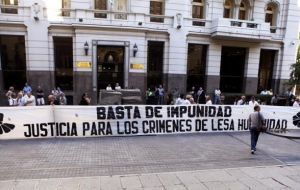MercoPress. South Atlantic News Agency
Demonstration against Uruguay Supreme Court to protest human rights rulings
 The building of the Supreme Court on Friday 14 was stormed by human rights groups
The building of the Supreme Court on Friday 14 was stormed by human rights groups Human rights groups with the support from political organizations, labour unions and students are planning a march and demonstration against Uruguay’s Supreme Court to protest a ruling that in effect re-instates an amnesty law which benefits military and police officers allegedly involved in human rights crimes during the 1973/84 dictatorship.
The march planned for Monday afternoon and supported by the different political groupings that make up the ruling coalition refers to an issue that remains highly sensitive for Uruguayan public opinion and has been present for the last twenty five years.
Following the return to democracy in 1985, Parliament under the administration of President Julio Maria Sanguinetti approved the Expiry Bill or Law on the Expiry of the Punitive Claims of the State, an amnesty which benefited military and security personnel. The bill however granted the Executive the power to open certain cases.
The bill was ratified, comfortably, in a referendum in 1989 and again in 2009, under a completely different government. Nevertheless the government of President Jose Mujica with ample legislative support, and allegedly against his will, approved in 2011 an interpretative bill which in fact annulled the original Expiry Law and opened a flood of trials against military and police staff allegedly involved in human rights crimes.
The interpretative bill which declared crimes against human rights ‘imprescriptible’, contrary to the opinion of several constitutional experts consulted at the time, apparently introduced a retroactive concept which infringed certain basic legal principles.
As a consequence of the ruling, voted four in five, the prescription stands and over fifty trials demanding compensations for human rights crimes, will not proceed, although those military and police officers already sentenced will remain imprisoned.
The reaction from the ruling coalition was immediate and one of the main groups, founded by President Mujica, the Movement of Popular Participation, MPP, called for impeachment of the Supreme Court, and sponsored the call for the Monday protest. However other groups of the ruling coalition are divided on the impeachment issue. At the most there is consensus to take the case to an international court.
To this must be added a previous decision from the Supreme Court, but in the administrative field, which transferred Judge Mariana Mota from a Criminal tribunal to the Civil jurisdiction, which was also rejected by human rights groups since she had been at the forefront of investigations into human rights violations.
On Friday 15 February an estimated 300 demonstrators stormed the Supreme Court when Judge Mota was to take the oath of her new post. The ceremony was suspended, security forces were called in and finally the protestors left the building peacefully after much persuasion.
As a consequence since then and following last Friday’s (Feb 22) ruling on the Expiry Law, all Supreme Court judges have a discreet security protection and have been recommended by the Police to advance their movements and avoid routine displacements.
The march is convened under the flag of “Don’t let Justice be taken”, but despite the full support from the coalition, comes at a moment in which the government of President Mujica is divided on economic and fiscal policies.
His immediate advisors are demanding “tax the rich and those benefited from the windfall of these years”, while the team supported by Vice-president Danilo Astori and who have steered the Uruguayan economy for the last eight years is more orthodox in its approach and bewares of “breaking the rules of the game” for investors.
The dispute erupted openly following another ruling from the Supreme Court which declared a special tax on ‘rural concentration’ unconstitutional because it doubled taxed land and under Uruguayan law, land duties are collected by local governments.




Top Comments
Disclaimer & comment rules-

-

-

Read all commentsIf Mujica wants to impeach the Supreme Court, in whiich court will the impeachment take place? By the politicians? That will be totally uncustitutioal as the judicial and executive powers are totally independent. Any ideas?
Feb 25th, 2013 - 02:24 pm 0@1 redpoll
Feb 25th, 2013 - 05:47 pm 0“By the politicians?”
No other choice is there? In most democracies the legislature (Lords in the UK) are the final arbiters of what they intended when the judiciary was set up.
This case is a bit unusual though and I would have thought the President could have vetoed the second law which removed the first.
The main reason for the first law is to remove the chance of another coup surely? I have no doubt the original military would have been tempted to take over again if they thought they were going to jail.
Does the Supreme Court not head up to the President?
A conumdrum to which I dont know the answer
Feb 25th, 2013 - 07:26 pm 0Commenting for this story is now closed.
If you have a Facebook account, become a fan and comment on our Facebook Page!